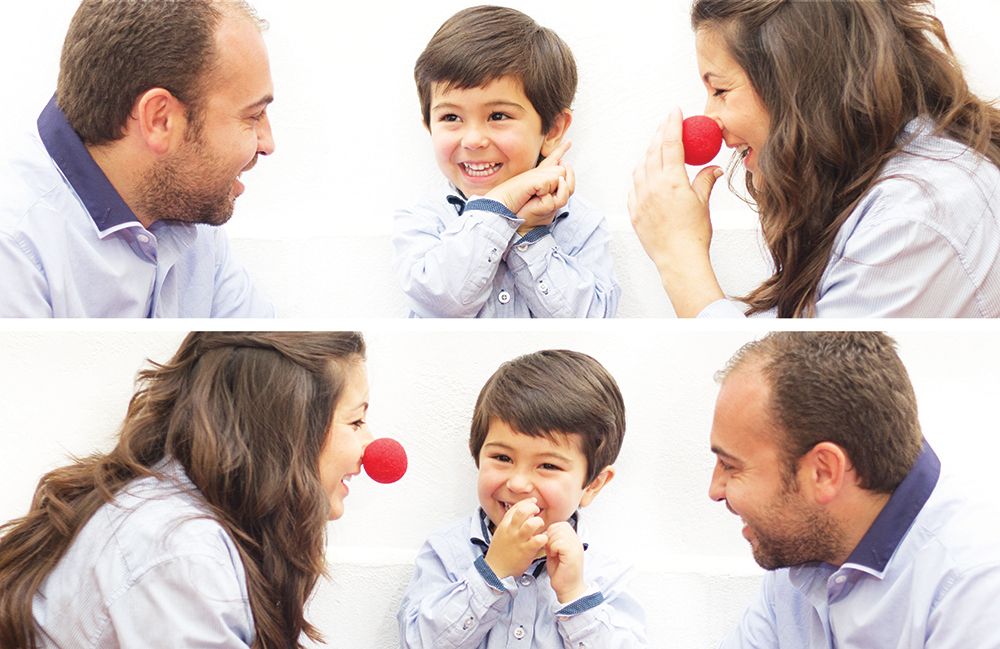
Medidas de conciliación laboral que te ayudarán a pasar más tiempo con tus hijos
La tasa de natalidad en España (número de nacimientos por cada mil habitantes en un año) fue en 2016 del 8,8‰ (muy baja), y el índice de Fecundidad (número medio de hijos por mujer) de 1,34.
Si a estos datos les sumamos que la edad para ser padres se ha retrasado hasta los 31 años, vemos que el panorama no es muy esperanzador.
Y no nos extraña: tener hijos en España no es algo fácil. Los sueldos son bajos y las condiciones laborales no ayudan a poder disfrutar de la familia.
La Ley 39/1999 de conciliación de la vida familiar y laboral otorga una serie de derechos a los padres para favorecer que los españoles puedan seguir trayendo pequeños retoños a este mundo sin tener que depender de los abuelos.
Hoy te contamos cuáles son estas medidas de conciliación laboral que se enumeran en la Ley 39/1999 para que sepas cuáles son tus derechos si eres o vas a ser mami o papi.
¿Qué es la conciliación?
Antes de pasar a ver las medidas exactas de conciliación laboral que existen en España, queremos explicarte qué es.
La conciliación laboral y familiar son todas aquellas medidas y políticas que toma una empresa para garantizar que sus trabajadores puedan compatibilizar su trabajo con su vida y obligaciones familiares.
Se trata de medidas que aumentan la productividad de los trabajadores, ya que éstos son más felices y aprovechan más el tiempo trabajado. Además, también sirven para captar y retener talento, debido a la lealtad de los trabajadores que están satisfechos y contentos con su ambiente de trabajo.

8 medidas que te ayudarán a conciliar trabajo y familia
Ahora sí que sí, pasemos a hablar de las 8 medidas de conciliación laboral y familiar que existen en España para que los papis y mamis puedan compatibilizar su trabajo con su familia.
1. Permiso de maternidad
En España, la baja maternal es de 16 semanas (y no cuatro meses como muchos se piensan). Durante estas 16 semanas, la mamá trabajadora cobrará el 100% de su sueldo, aunque debe haber cotizado, al menos, 180 días durante los últimos siete años o 360 días en toda su vida laboral. Hay excepciones: si la mamá tiene menos de 21 años cuando nazca el bebé no se le exige periodo mínimo de cotización y, si tiene entre 21 y 26, esta exigencia se reduce a 90 días.
En el caso de que la madre (independientemente de su edad) no trabaje o no haya cotizado lo suficiente para cobrar la prestación habitual, tendrá derecho, durante 42 días naturales contados desde la fecha del parto, a cobrar el IPREM (indicador público de renta de efectos múltiples), es decir, 532,51€ mensuales. En algunos supuestos, como familias numerosas, monoparentales, discapacidad o parte múltiple, estos 42 días son ampliables en 14 días más.
De las 16 semanas de permiso por maternidad, las seis primeras semanas posteriores al parto deben ser disfrutadas por la madre obligatoriamente. Sin embargo, las otras diez semanas pueden ser repartidas con su pareja.
2. Permiso de paternidad
Afortunadamente, el 1 de enero de 2017 entró en vigor la ampliación a un mes del permiso por paternidad (recordemos que antes solamente podían disponer de dos semanas).
El permiso de paternidad es un un derecho retribuido y los padres tienen derecho a cobrar el 100% de su base reguladora durante el mes que dura. Para solicitarlo, hay que estar afiliado a la seguridad social y haber cotizado un mínimo de 180 días en los últimos 7 años, o 360 días cotizados a lo largo de la vida laboral.
3. Permiso de lactancia
Las mamás trabajadoras tienen derecho a una hora de ausencia del trabajo (por cada ocho horas de trabajo) por lactancia de un hijo menor de nueve meses. Si quieren, podrán dividir esta hora en dos mitades de media hora.
La duración del permiso de lactancia se incrementará proporcionalmente en los casos de parto múltiple.
Es la trabajadora, y sólo ella, quien decide cuándo quiere disfrutar de esta pausa que, asimismo, puede también ser acumulada en forma de días, para que se puedan disfrutar a continuación del permiso de maternidad.
4. Medidas de seguridad para embarazadas y lactantes
Además del permiso de lactancia, España reconoce, a través de la Ley de prevención de riesgos laborales, las recomendaciones de seguridad que marca la Organización Internacional del Trabajo (OIT) para las mujeres en periodo de lactancia o embarazadas.
Entre otros muchos aspectos, en esta Ley se recoge la prohibición a las mujeres embarazadas o lactantes del trabajo nocturno y de las horas extraordinarias, así como los trabajos que impliquen levantar o empujar grandes pesos o que exijan un esfuerzo físico excesivo.
En el caso de que la mujer embarazada o lactante esté empleada en un trabajo que el médico certifique como peligroso, tendrá que ser transferida, sin reducción de salario alguno, a otro puesto que no sea perjudicial para su estado.
5. Reducción de jornada
Otra de las medidas de conciliación laboral que existen en España es la reducción de jornada por maternidad o paternidad. Este es uno de los derechos a los que los trabajadores que han sido padres se acogen de manera más habitual, pero también uno de los que más problemas genera con los empresarios.
La Ley de conciliación española recoge el derecho de los padres y madres a reducir su jornada para cuidar a niños menores de ocho años. Eso sí, se trata de un derecho no retribuido, es decir, vendrá acompañado de una reducción salarial proporcional a las horas que se dejan de trabajar.
La disminución de la jornada del trabajador puede estar fijada entre un octavo y un 50% de la misma, como máximo. Hay que saber que este derecho se amplía a familiares hasta segundo grado de consanguinidad o afinidad que no se valgan por sí mismos.
Hay que tener en cuenta que, para solicitar la reducción laboral, es necesario tener un mínimo de un año de antigüedad en la empresa. Esta reducción tendrá una duración tope de tres años seguidos por cada hijo y dos por cada familiar, acumulables hasta un máximo de cinco años.
6. Modificación de la jornada laboral
Los padres pueden solicitar a la empresa una adaptación del horario de trabajo sin necesidad de tener que reducir la jornada y, por lo tanto, también el salario. Sin embargo, la empresa es la que decide si concederla o no.
Este derecho está reconocido en la legislación laboral, pero a través del artículo 34.8 del Estatuto de los Trabajadores de 2012 (y no del artículo 37.5, que es el que recoge la reducción de jornada), lo que significa que la concesión dependerá de lo que establezca el convenio colectivo de aplicación o, en su defecto, el acuerdo entre las partes.
7. Excedencias
Las excedencias solicitadas por maternidad, paternidad o por cuidado de algún familiar enfermo o dependiente, tienen garantizadas el derecho del trabajador a que le guarden el puesto de trabajo durante, al menos, un año.
El tiempo de excedencia cuenta como cotizados si es para cuidar a hijos (hasta dos años) u otros familiares (un año).
8. Ayudas para autónomos
Uno de los colectivos que sale peor parado en cuanto a las medidas de conciliación laboral y familiar concierne es, como casi siempre, el de los autónomos.
Aunque tienen algunos derechos laborales, lamentablemente no son equiparables a los de los trabajadores por cuenta ajena.
Pueden disfrutar del permiso retribuido por maternidad o paternidad, siempre que cumplan con los mismos requisitos que los empleados por cuenta ajena en relación al periodo mínimo de cotización (un mínimo de 180 días en los últimos 7 años, o 360 días cotizados a lo largo de la vida laboral), y percibiendo la retribución correspondiente en función a la base reguladora por la que estuvieran cotizando antes del comienzo de la baja.
Como ves, existen ciertas medidas de conciliación laboral y familiar que pueden ayudarte a disfrutar más tiempo con los más peques de la casa. ¿Las conocías todas?

Measures of work-life balance that will help you spend more time with your children
The birth rate in Spain (number of births per thousand inhabitants in a year) was in 2016 8, 8‰ (very low), and the fertility rate (average number of children per woman) of 1.34.
If we add to this the fact that the age of parenthood has been delayed until the age of 31, we see that the outlook is not very encouraging.
And it doesn’t surprise us: having children in Spain is not easy. Salaries are low and working conditions do not help to be able to enjoy the family.
Act 39/1999 on the reconciliation of work and family life grants a series of rights to parents to ensure that Spaniards can continue to bring small children to this world without having to depend on their grandparents.
Today we talk about these measures of work-life balance that are listed in the Act 39/1999, so you know what your rights are if you are or are going to be mommy or daddy.
What is work-life balance?
Before moving on to see the exact measures of work-life balance that exist in Spain, we want to explain to you what it is.
The work-family life balance are all the measures and policies that takes a company to ensure that employees can combine their work with their life and family obligations.
These are measures that increase the productivity of the workers, since they are happier and make more use of the time they work. In addition, they also serve to attract and retain talent, due to the loyalty of workers who are satisfied and happy with their work environment.

8 measures to help you reconcile work and family
Now yes, let’s talk about the 8 measures of work-life balance that exist in Spain so that dads and moms can reconcile their work with their families.
1. Maternity leave
In Spain, the maternity leave is 16 weeks (and not four months as many people think). During these 16 weeks, the working mother will receive 100% of her salary, although she must have contributed at least 180 days during the last seven years or 360 days in her entire working life. There are exceptions: if the mother is under 21 years of age when the baby is born, no minimum contribution period is required and, if she is between 21 and 26, this requirement is reduced to 90 days.
If the mother (regardless of her age) does not work or has not contributed enough to receive the usual benefit, she will be entitled to receive the IPREM (public indicator of income with multiple effects) for 42 calendar days from the date of birth, i.e. 532.51€ per month. In some cases, such as large families, single-parent families, disability or multiple part, these 42 days may be extended by 14 days.
Of the 16 weeks of maternity leave, the first six weeks after the birth must be taken by the mother. However, the other ten weeks can be shared with their partner.
2. Paternity leave
Fortunately, on 1st January 2017, the extension of paternity leave to one month came into force (remember that before they could only have two weeks).
Paternity leave is a paid entitlement and fathers are entitled to 100% of their regulatory base for the month it lasts. To apply, you must be registered with social security and have paid at least 180 days’ contributions in the last 7 years, or 360 days’ contributions during your working life.
3. Breastfeeding leave
Working mothers are entitled to one hour’s absence from work (for every eight hours of work) for breastfeeding a child less than nine months. If they want, they can divide this time into two halves of half an hour.
The duration of the breastfeeding leave will be increased proportionally in cases of a multiple birth.
It is the worker, and she alone, who decides when she wants to take this break, which can also be accumulated in the form of days, so that she can take following the maternity leave.
4. Safety measures for pregnant and lactating
In addition to breastfeeding leave, Spain recognises, through the Law on the Prevention of Occupational Hazards, the safety recommendations established by the International Labour Organisation (ILO) for breastfeeding or pregnant women.
Among many other aspects, this Act prohibits pregnant or nursing women from working at night and overtime, as well as work involving lifting or pushing heavy weights or requiring excessive physical effort.
If the pregnant or nursing woman is employed in a job that the doctor certifies as dangerous, she must be transferred, without any reduction in salary, to another job that is not harmful to her condition.
5. Reduction in working hours
Another of the measures to reconcile work and family life in Spain is the reduction in working hours due to maternity or paternity. This is one of the rights to which workers who have been parents are most frequently entitled, but also one of the rights that causes most problems with employers.
The Spanish Reconciliation Act collects the right of fathers and mothers to reduce their day to take care of children under eight years old. But it a not remunerated right, that means, that it will be accompanied by a reduction in salary proportional to the hours that are left of work.
The reduction of the worker’s working day may be set at between one eighth and one half of the same, as a maximum. It is important to know that this right extends to relatives up to the second degree of consanguinity or affinity who do not support themselves.
It should be noted that, to apply for the job reduction, it is necessary to have a minimum of one year of seniority in the company. This reduction will top last for three years in a row for each child and two for each relative, accumulative up to a maximum of five years.
6. Modification of the working day
Parents may request to the company an adaptation of the working hours without the need of having to reduce the day and, therefore, neither the salary. However, the company is to decide whether to grant it or not.
This right is recognised in labour legislation, but through Article 34.8 of the 2012 Workers’ Statute (and not through Article 37.5, which provides for the reduction of working hours), which means that the concession will depend on what is established in the applicable collective agreement or, failing that, the agreement between the parties.
7. Leaves of absence
Leaves of absence requested for maternity, paternity, or for care of a sick family member, or a dependent, have guaranteed the right of the worker to keep the job for at least a year.
Leave of absence counts as contributions if it is to care for children (up to two years) or other family members (one year).
8. Aid for self-employed
One of the groups that is worse off in terms of measures to reconcile work and family life is, as is almost always the case, the self-employed.
Although they have some labour rights, they are unfortunately not comparable to those of employees.
They may take paid maternity or paternity leave, provided that they meet the same requirements as employees in relation to the minimum contribution period (a minimum of 180 days in the last 7 years, or 360 days of contributions throughout their working lives), and they receive the corresponding remuneration according to the regulatory basis for which they were contributing before the start of their leave.
As you can see, there are certain measures of reconciliation of work and family life that can help you enjoy more time with your kids. Did you know them all?




